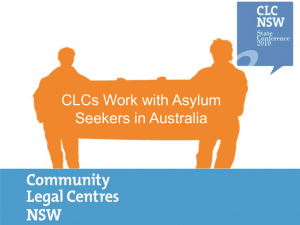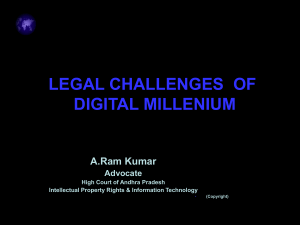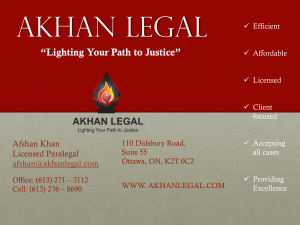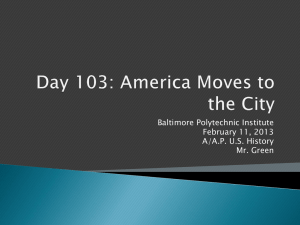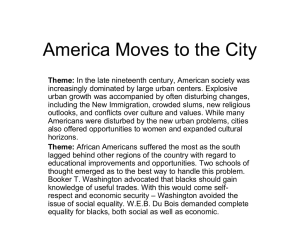Federal Courts
advertisement
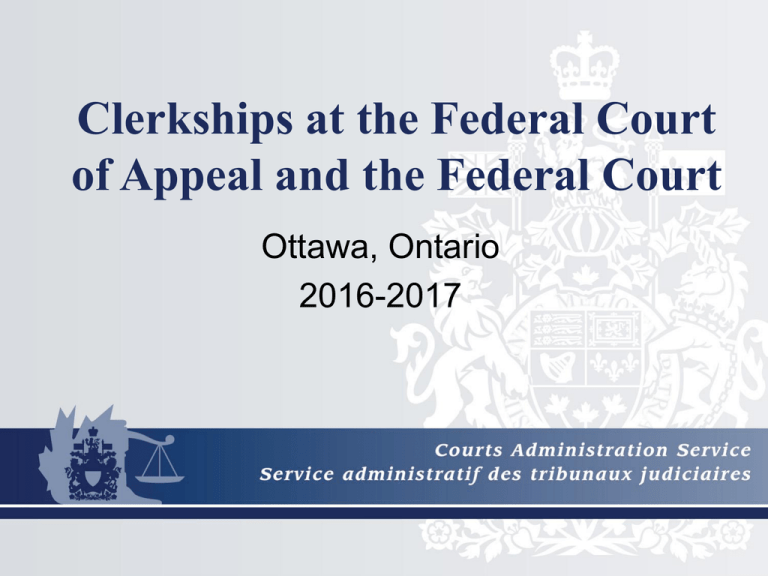
Clerkships at the Federal Court of Appeal and the Federal Court Ottawa, Ontario 2016-2017 The Federal Court Jurisdiction The Federal Court's jurisdiction - its scope of authority to hear and decide issues - extends across the federal landscape. National Coverage Geographically, the Court may sit anywhere in Canada and regularly conducts hearings and renders decisions in disputes across the country, with Registry offices conveniently located in all major cities. Orders of the Court are binding in every province and territory, thus providing efficient, national coverage. Federal Subject Matter Unlike the Superior Courts established by the provinces, the Federal Court does not have inherent, general jurisdiction. In order for the Federal Court to have authority to hear a given subject matter: – – – that subject matter must be assigned to Parliament under the Constitution; there must be actual, existing and applicable federal law; and the administration of that law must have been conferred upon the Federal Court This test is referred to as the ITO test after the case of ITO-Int. Terminal Operators Ltd. V Miida Electronics Inc. (1986) 1 S.C.R. 752. 2 Areas of Jurisdiction The jurisdiction of the Federal Court is conferred by the Federal Courts Act and, at present, close to a hundred other applicable federal statutes. These give the Court authority to hear and decide cases in a number of broad categories including: – – – – – – – – National Security Review of Federal Government Decisions Claims Involving the Federal Crown Immigration and Refugee Law First Nations’ Claims Intellectual Property Maritime and Admiralty Disputes Other Areas of Jurisdiction 3 Areas of Jurisdiction (Continued) National Security The Federal Court is assigned responsibility for reviewing: – security certificates – warrant requests – applications regarding the public disclosure of evidence. 4 Areas of Jurisdiction (Continued) Review of Federal Government Decisions The Federal Court has exclusive jurisdiction to review the legality of actions of most federal offices, boards, commissions, and tribunals. On this basis, most government decisions at the federal level may be challenged in the Federal Court, including but not limited to decisions regarding: – – – – – – – – – – – – – – – immigration and refugee matters elections official languages access to information privacy passports prisoners in federal institutions war veterans application of the Canadian Charter of Human Rights environmental impact assessment public works national defence public service employment aeronautics and transportation oceans and fisheries 5 Areas of Jurisdiction (Continued) Immigration and Refugee Law The Federal Court is responsible for applications for leave and judicial review in the following areas of immigration and refugee law: Refugee Cases Immigration and Refugee Board – Refugee Appeal Division (refugee leave applications, motions to stay a removal, deportation or release Order; application for non-disclosure; referral of certificate) Pre-risk Removal Assessment Non-Refugee Cases Immigration and Refugee Board - Immigration Appeal Division Immigration and Refugee Board – Immigration Division Other decisions arising within and outside of Canada - Citizenship and Immigration Canada, Canada Board Services Agency, the Minister of Citizenship and Immigration, etc. 6 Areas of Jurisdiction (Continued) Claims involving the Federal Crown The Federal Court shares jurisdiction with the provincial superior courts with respect to claims by and against the federal Crown. The Court's jurisdiction with respect to Crown litigation involves a range of significant disputes, including: – First Nations' claims regarding inherent aboriginal rights and treaty rights – contractual disputes relating to the provision of goods and services to the federal government – civil liability claims for injury by agents of the federal government 7 Areas of Jurisdiction (Continued) Intellectual Property The Federal Court has extensive jurisdiction to resolve disputes regarding intellectual property rights, including: – – – – – copyright industrial design integrated circuits patents and patented medicines trade-marks 8 FCA Areas of Jurisdiction Similar Jurisdiction : • The Federal Court of Appeal hears appeals of decisions of the Federal Court. Different Jurisdiction: • Tax: appeals of decisions of the Tax Court of Canada. • Judicial Review: Applications for judicial review of decisions from federal offices listed in section 28 of the Federal Courts’ Act: CRTC, NEB, Competition Tribunal, Social Security Tribunal, to name but a few. • Immigration: only when a question has been certified in Federal Court. In practice, this means few immigration cases. 9 The Federal Court Composition: • One Chief Justice and 30 other full-time judges (2 vacancies) plus 6 supernumerary judges and 6 prothonotaries from across the country • Itinerant Court – based in Ottawa, but cases heard across country • In Ottawa, the Court is situated at 90 Sparks Street • 1 law clerk per judge, except for supernumerary judges who share the services of clerks • Occasionally, law clerks provide assistance to the prothonotaries 10 The Federal Court of Appeal Composition: • One Chief Justice plus 10 full-time members plus 4 supernumerary judges • Judges sit in panels of 3 (5 exceptionally) • Also an itinerant court that sits throughout Canada, based in Ottawa at 90 Sparks • Appeals from FCA go to SCC (by leave) • 1 law clerk per judge, supernumerary judges may share the services of clerks 11 Promotion of the Law Clerk Program • Each year the FCA and the FC hire approximately 49 law clerks – 12 for Federal Court of Appeal – 37 for Federal Court • What’s involved – legal research support for judges, including: • research specific legal issues • prepare bench memoranda on court files • edit draft judgments and • assist in preparation of speeches / papers for presentation by judge 12 What the FCA and FC Look for Generally in a Law Clerk • • • • • • • Excellent legal research and analytical skills Thoroughness Judgment Good writing skills Initiative Availability Reliability 13 Valuable Legal Experience • Primarily one on one relationship for one year with full time judges; most judges have 20 – 30 years experience in legal profession • Opportunity to work with different judges and Prothonotaries on individual files • Fulfills articling requirements for Ontario and Québec (for the other jurisdictions, the students should verify this with the law society in which they will seek admission) 14 FCA / FC Speakers’ Program • A variety of interesting speakers throughout the year, both from within the Courts as well as external guest speakers – – – – – – – – In recent years, speakers included Judge Posner, 7th Circuit United States Court of Appeals Justice North, Federal Court of Australia Nathalie DesRosiers, Cdn Civil Liberties Ass’n Alan Borovoy, Cdn Civil Liberties Association Judge Pal, Supreme Court of India Brian Saunders, Director of Public Prosecutions Peter Hutchins, private practitioner in Aboriginal law 15 Practical Info re: Application Process • Application deadline – For 2015-2016: the hiring process is now complete. – For the 2016-2017 clerkship year: applications must be submitted by January 23rd, 2015 – Note: Applications are submitted on-line (please refer to the FCA or FC website). The on-line application portal will be available starting December 15, 2014 16 Interviews • Interviews usually start in February and end in April • Some interviews conducted locally if judge in town for hearings • Interviews can also be conducted by videoconferencing and/or teleconferencing links or by Skype 17 Salary & Benefits • SALARY: Current salary is $59,756 per annum • BENEFITS : – Dental Plan (premiums presently covered by employer) – Public Service Health Care Plan (optional - employee and employer contribute) – Long Term Disability Insurance (mandatory) – Death Benefits (mandatory) – Superannuation Plan (mandatory) – 3 weeks of vacation (15 days working days) – Sick leave: As provided by the EC Collective Agreement For further information, please contact Me Marie-Claire Perrault – FCA at 613.995.4549 or Me Marc D. Reinhardt - FC at 613.995.4547 or visit our web sites at: – www.fca-caf.gc.ca – www.fct-cf.gc.ca 18 Qs & As • Recommended courses: – administrative law, immigration / refugee law, maritime law, intellectual property, human rights law, environmental law, etc. – none is mandatory, but all useful. A course on evidence is highly recommended. Taxation law would be viewed as an additional asset if you are applying for the FCA. • Workload: – heavy particularly in Fall during early stages of learning curve 19



